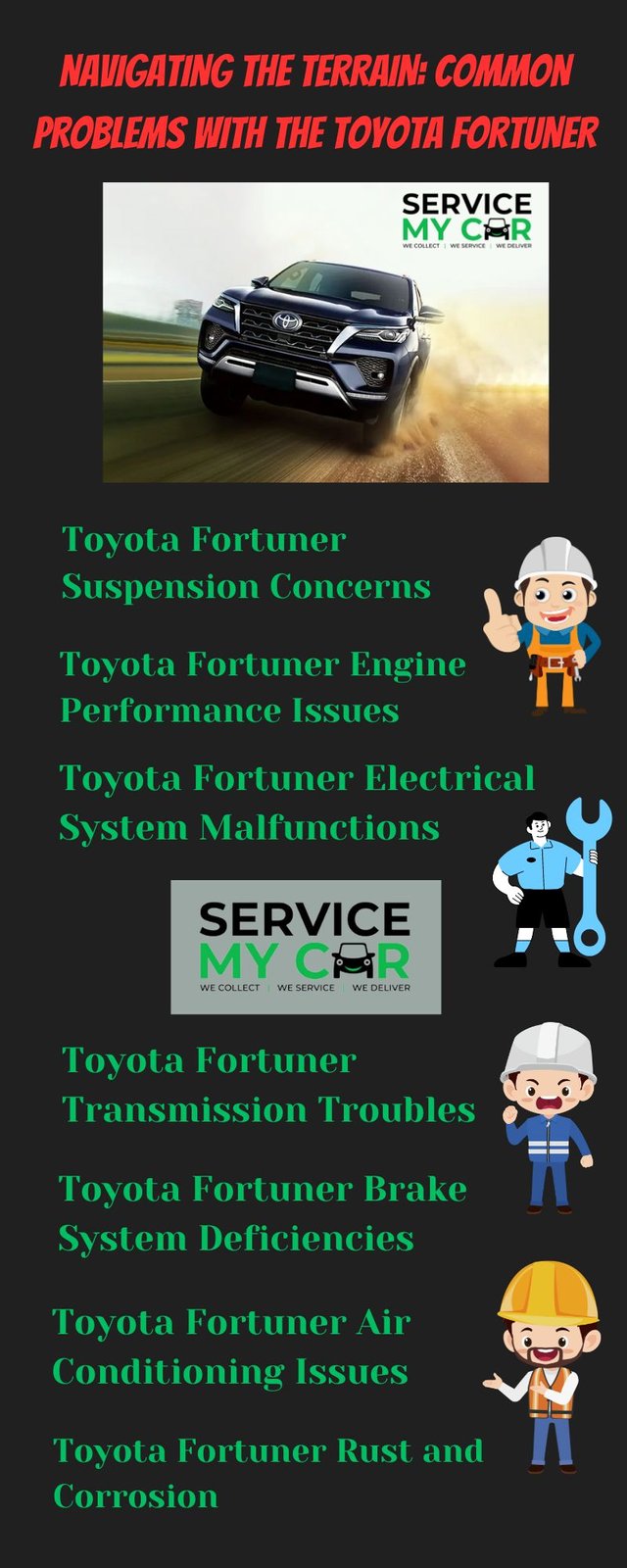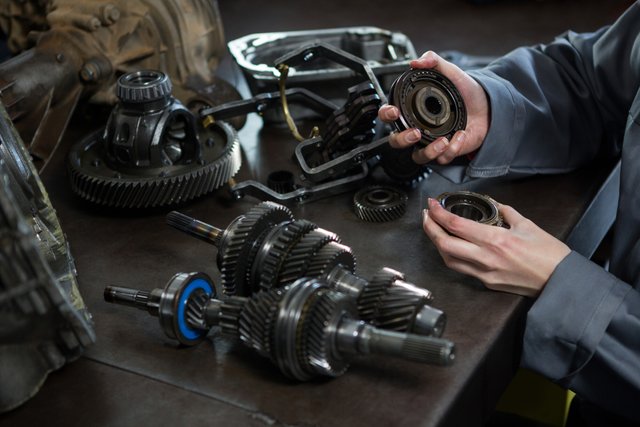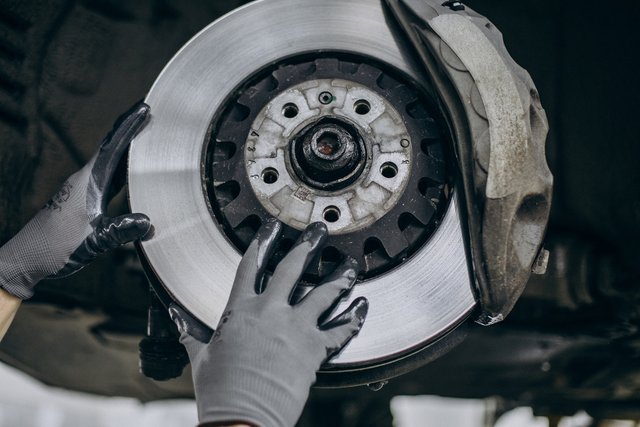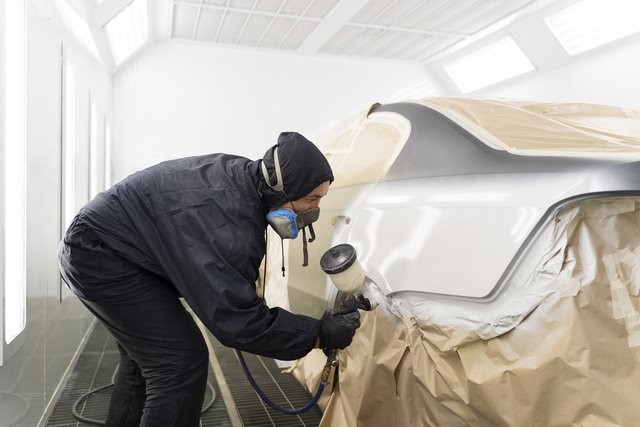Navigating the Terrain: Common Problems with the Toyota Fortuner
Navigating the Terrain: Common Problems with the Toyota Fortuner

When it comes to SUVs, the Toyota Fortuner stands tall as a reliable companion for both urban commutes and off-road adventures. However, like any vehicle, it's not immune to occasional issues that can arise over time. In this comprehensive guide, we'll explore some common problems that Toyota Fortuner owners may encounter, along with tips on how to address them effectively.
Toyota Fortuner Suspension Concerns

One of the most frequently reported issues with the Toyota Fortuner involves problems with its suspension system. Owners have reported experiencing excessive noise or clunking sounds when driving over bumps or rough terrain. This issue can often be attributed to worn-out suspension components such as bushings, shock absorbers, or ball joints. Over time, these parts can deteriorate due to regular wear and tear, leading to a compromised driving experience.
Solution: If you notice any unusual noises or vibrations coming from your Fortuner's suspension, it's essential to have it inspected by a qualified mechanic. Depending on the severity of the issue, repairs may involve replacing worn-out components or performing a comprehensive suspension overhaul.
Toyota Fortuner Engine Performance Issues

While the Toyota Fortuner is known for its robust engine performance, some owners have reported encountering problems such as loss of power, rough idling, or engine stalling. These issues can be attributed to various factors, including fuel system issues, ignition problems, or engine sensor malfunctions. Left unaddressed, engine performance issues can lead to reduced fuel efficiency and drivability concerns.
Solution: If you experience any engine-related problems with your Fortuner, it's essential to have it diagnosed by a qualified mechanic. A comprehensive engine inspection can help identify the root cause of the issue, whether it's a faulty sensor, clogged fuel injector, or ignition system malfunction. Timely repairs and regular maintenance can help ensure optimal engine performance and longevity.
Toyota Fortuner Electrical System Malfunctions

Another common issue reported by Toyota Fortuner owners involves electrical system malfunctions, such as malfunctioning power windows, faulty central locking, or intermittent dashboard warning lights. These problems can be caused by a variety of factors, including wiring issues, faulty switches, or failing electronic components. Electrical gremlins can be particularly frustrating to diagnose and repair, requiring the expertise of a skilled technician.
Solution: If you're experiencing electrical problems with your Fortuner, it's essential to have the vehicle's electrical system inspected by a qualified technician. A comprehensive diagnostic scan can help identify any underlying issues, allowing for targeted repairs or component replacements as needed. Additionally, regular maintenance and inspections can help prevent electrical problems before they occur.
Toyota Fortuner Transmission Troubles

Some Toyota Fortuner owners have reported experiencing transmission-related issues, such as rough shifting, delayed engagement, or transmission fluid leaks. These problems can be attributed to various factors, including worn-out clutch plates, damaged seals, or transmission fluid contamination. Left unaddressed, transmission issues can lead to costly repairs and potential drivability concerns.
Solution: If you notice any signs of transmission trouble with your Fortuner, it's essential to have it inspected by a qualified mechanic. A thorough transmission inspection can help identify any underlying issues, whether it's worn-out components or fluid leaks. Depending on the severity of the problem, repairs may involve replacing damaged parts or performing a transmission fluid flush and refill.
Toyota Fortuner Brake System Deficiencies

Brake system issues are another common concern among Toyota Fortuner owners, with reports of problems such as brake pedal pulsation, premature brake pad wear, or brake fluid leaks. These issues can compromise the vehicle's braking performance and safety, posing a significant risk to driver and passenger safety.
Solution: If you experience any brake-related problems with your Fortuner, it's crucial to have the vehicle's braking system inspected by a qualified technician. A comprehensive brake inspection can help identify any underlying issues, whether it's worn-out brake pads, damaged rotors, or leaking brake lines. Timely repairs and regular brake maintenance can help ensure optimal braking performance and safety.
Toyota Fortuner Air Conditioning Issues

Some Toyota Fortuner owners have reported encountering problems with the vehicle's air conditioning system, such as inadequate cooling, unusual odors, or intermittent operation. These issues can be caused by various factors, including refrigerant leaks, compressor malfunctions, or faulty HVAC controls. A malfunctioning air conditioning system can compromise passenger comfort, especially during hot weather conditions.
Solution: If you notice any issues with your Fortuner's air conditioning system, it's essential to have it inspected by a qualified technician. A comprehensive inspection can help identify any leaks, damaged components, or electrical issues affecting the system's performance. Depending on the diagnosis, repairs may involve refrigerant recharging, component replacement, or system recalibration to restore optimal cooling performance.
Toyota Fortuner Rust and Corrosion

Over time, some Toyota Fortuner owners may notice the onset of rust or corrosion on various exterior and underbody components, particularly in regions with harsh weather conditions or high humidity levels. Common areas prone to rusting include the vehicle's frame, suspension components, and body panels. Rust and corrosion can compromise the structural integrity of the vehicle, leading to safety concerns and aesthetic deterioration.
Solution: Preventive maintenance and proactive rust protection measures can help mitigate the risk of rust and corrosion on your Fortuner. Regular washing and waxing can help protect the vehicle's exterior surfaces from corrosive elements, while applying rust-inhibiting coatings to vulnerable areas can provide an additional layer of protection. Additionally, addressing any paint chips or scratches promptly can help prevent rust from spreading and causing further damage. If significant rust or corrosion is present, professional rust repair and restoration may be necessary to address the issue effectively.
Conclusion
While the Toyota Fortuner is undoubtedly a capable and reliable SUV, it's essential for owners to be aware of potential issues that may arise over time. By staying vigilant and addressing problems promptly, you can help ensure that your Fortuner remains in peak condition for years to come. Whether it's suspension concerns, engine performance issues, electrical system malfunctions, transmission troubles, or brake system deficiencies, proactive maintenance and timely repairs are key to keeping your Fortuner running smoothly on and off the road.
Thanks for reading the blog. If you are wondering, how do you find the nearest car garage for car tyre change? Open Google and type car tyre change and you will find Service My Car at the top to get the best car tyre change service in the town.